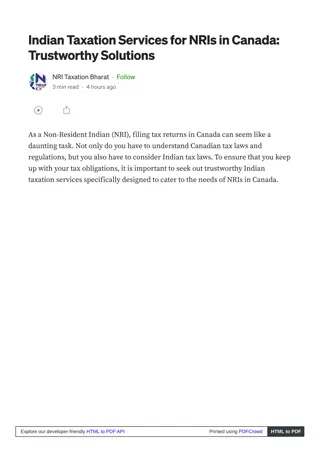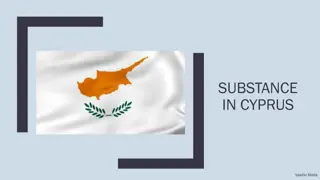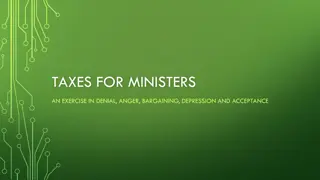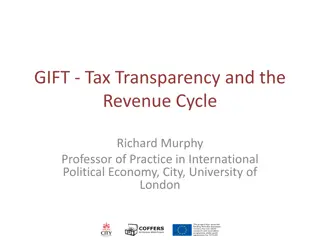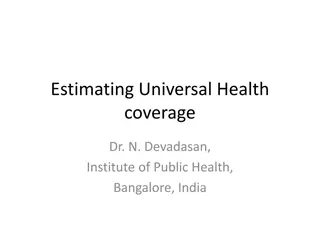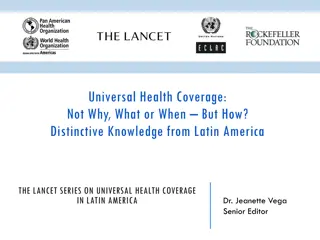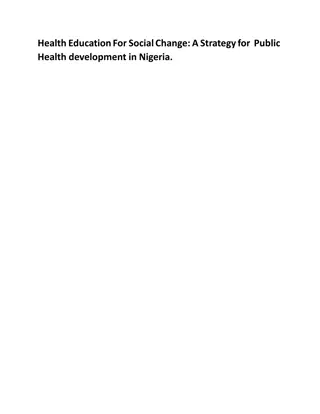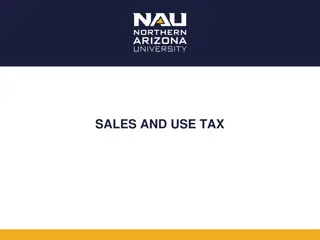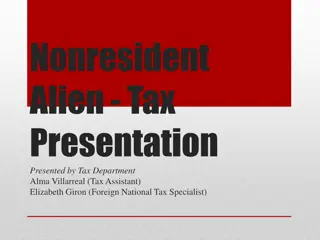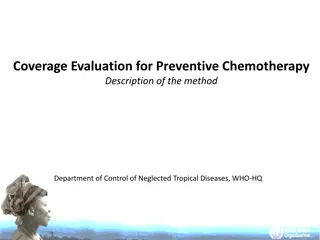Feasibility of Tax for Universal Health Coverage in Nigeria
Nigeria reaffirmed its commitment to Universal Health Coverage (UHC) as a human right in 2014. However, the country still faces challenges in achieving UHC due to high out-of-pocket expenses. Implementing a Tax for Service (T4S) model could create fiscal space and help spread financial risks, leading to improved health outcomes. This presentation by Dr. Ahmad Abdulwahab explores the feasibility of implementing such a tax system, critical success factors, and the potential benefits for achieving UHC in Nigeria.
Download Presentation

Please find below an Image/Link to download the presentation.
The content on the website is provided AS IS for your information and personal use only. It may not be sold, licensed, or shared on other websites without obtaining consent from the author.If you encounter any issues during the download, it is possible that the publisher has removed the file from their server.
You are allowed to download the files provided on this website for personal or commercial use, subject to the condition that they are used lawfully. All files are the property of their respective owners.
The content on the website is provided AS IS for your information and personal use only. It may not be sold, licensed, or shared on other websites without obtaining consent from the author.
E N D
Presentation Transcript
HEALTH Feasibility of the Tax for Service for Universal Feasibility of the Tax for Service for Universal Health Coverage in Nigeria Health Coverage in Nigeria Dr Ahmad Abdulwahab, Senior Health Advisor, NGF Presentation @ the Nigeria Governors Forum Peer Learning Event, Transcorp Hilton Hotel, Abuja 29thSeptember 2021 www.nggovernorsforum.org
Outline Outline HEALTH Context The Journey towards UHC Linkage of UHC and T4S Feasibility of the T4S model Critical success factors Benefits and Results Implementation framework Conclusion www.nggovernorsforum.org
Health is a human right and Nigeria reaffirmed its commitments Health is a human right and Nigeria reaffirmed its commitments to UHC at the UHC presidential summit held in 2014 to UHC at the UHC presidential summit held in 2014 HEALTH Health is a human right UHC seeks to achieve this by ensuring all persons receive the health services they need without suffering financial hardship. Out of pocket expenses on health in Nigeria still remains very high at 77% Need for reforms to create fiscal space and convert out-of-pocket payments into pooled funding for health Pooling funds from compulsory funding sources (eg. Tax revenue) can spread the financial risks of illness across a population (WHO) Tax for Service is a fit for purpose reform that will improve the fiscal space and attainment of UHC www.nggovernorsforum.org Context
Even though there has been some progress towards UHC especially with the BHCPF and establishment of SSHIS, the country still has a long way to go to achieve UHC HEALTH Health Expenditure as a % of GDP Global Av.: 9.9% Actual: 3.9% Out of Pocket Expenses on Health Global Av: 40% Actual: 77% UHC Service Coverage Index Target: 80 Actual: 42 Population covered by pre- payment and risk pooling PHC Summit target: 90% Actual: 5% www.nggovernorsforum.org The Journey towards UHC
Model seeks to improve health outcomes by addressing the Model seeks to improve health outcomes by addressing the problems of low revenue base, poor health allocation and high out problems of low revenue base, poor health allocation and high out of pocket expenses ultimately leads to attainment of UHC of pocket expenses ultimately leads to attainment of UHC HEALTH Tax for Health Model Mobilization Use of Technology Tax harmonization Presumptive Tax CORE ELEMENTS Focuses on informal sector Increased tax compliance Based on Presumptive Tax Regime Access and availability of better health services Stakeholder engagement and buy-in Free minimum package of healthcare at point of access Increased IGR Guaranteed and ringfenced fund allocation to health sector Availability and access to quality health services Guaranteed allocation of agreed proportion to health Increased fund allocation to health Strengthened PFM Allocative efficiency www.nggovernorsforum.org Linkage of UHC and T4S
Findings from the perceptions survey of informal sector Findings from the perceptions survey of informal sector workers on payment of taxes in exchange for a minimum workers on payment of taxes in exchange for a minimum package of care supports the feasibility of package of care supports the feasibility of TfS stakeholders to play expected roles stakeholders to play expected roles HEALTH TfS SPHCB/ SHIS HF SMOF/BEP SBIRS SMOH HSMB Register beneficiaries Accredits/sanctio ns HFs Claims management Payment of capitation Mobilization in collaboration with SBIRS Co-chairs the steering committee Policy formulation Fiscal policy coordination Impact evaluation Client satisfaction surveys (SBS) Co-chairs the steering committee Policy formulation Setting of standards Regulation Supervision/ monitoring to ensure availability of benefit package and provision of quality services Provision of benefit package Data Management Reporting Registration of Taxpayers Tax collection Remittance to SSHIS Mobilization in collaboratio n with SSHIS www.nggovernorsforum.org Feasibility of the T4S model 2/2
Success of the T4S is dependent on an interplay between three critical variables HEALTH Community Buy-in Political Buy-in Quality of service Successful T4S www.nggovernorsforum.org Critical success factors
Tax for Service reform increases the fiscal space and convert out Tax for Service reform increases the fiscal space and convert out- - of of- -pocket payments into pooled funding for health pocket payments into pooled funding for health HEALTH Improves tax morale Increases Internally Generated Revenue Increases the funding basket for SSHIS Increases accountability in health Accelerates progress towards SDG3 www.nggovernorsforum.org Benefits and Results
Projected Results HEALTH Results Assumptions 50% Based on the willingness to pay study of 1,500/month >15% Informal Sector labour force paying tax Budget allocation to Health 55% of generated fund allocated for purchase of health care 32% 60% Total population under Universal health Coverage in 4yrs Total population under Universal Health Coverage in 8yrs www.nggovernorsforum.org
Implementation Framework HEALTH Plan Plan Adopt Adopt M&E M&E Implement TfS Steering Committee DEVELOP TFS PLAN DEVELOP TFS PLAN ADOPTION BY STATE EXCO & ADOPTION BY STATE EXCO & APPROVAL BY SHOA APPROVAL BY SHOA MONITORING AND MONITORING AND EVALUATION EVALUATION IMPLEMENTATION OF TFS IMPLEMENTATION OF TFS MANDATE MANDATE Considerations for SC & TWGs: Considerations for SC & TWGs: Considerations: Considerations: For strategic oversight, For strategic oversight, coordination, and review of coordination, and review of implementation progress. implementation progress. Consist of representatives Consist of representatives of relevant MDAs (SHIS, of relevant MDAs (SHIS, SPHCDA, SDMA, SHMB). SPHCDA, SDMA, SHMB). SMoF, SAG, SIRS, etc.) SMoF, SAG, SIRS, etc.) Institute Technical Working Institute Technical Working Groups (TWGs) as may be Groups (TWGs) as may be necessary. necessary. Considerations for SExco and Considerations for SExco and SHoA: SHoA: Considerations SC and Considerations SC and SExco: SExco: Identify TfS package of Identify TfS package of interest (Minimum Standard interest (Minimum Standard Package) Package) Stakeholder mapping and Stakeholder mapping and engagement engagement Demand side Demand side beneficiaries Supply side Supply side service service providers, funding providers, funding aggregators and authorizers, aggregators and authorizers, etc. etc. Costing of TfS package Costing of TfS package (including actuarial analysis) (including actuarial analysis) Design funding programme Design funding programme (including fit (including fit- -for for- -purpose presumptive tax and presumptive tax and revenue sharing revenue sharing arrangement). arrangement). Identify technology needs Identify technology needs Develop TfS operational Develop TfS operational plan and guideline plan and guideline Enrolment of beneficiaries Enrolment of beneficiaries and service providers and service providers Public awareness and Public awareness and enlightenment campaigns enlightenment campaigns Review TfS plan and funds Review TfS plan and funds voted for take voted for take- -off. Consider ring fencing TfS Consider ring fencing TfS funding to a dedicated FUND. funding to a dedicated FUND. Consider official Consider official virement/supplementary virement/supplementary budget as may be appropriate budget as may be appropriate and request legislative and request legislative approval where necessary. approval where necessary. Other relevant laws or bills Other relevant laws or bills necessary to effectively necessary to effectively operationalizes e.g., operationalizes e.g., presumptive tax regulation, presumptive tax regulation, SHIA, etc. SHIA, etc. SC should enlist the SC should enlist the support of NGOs and support of NGOs and CSOs in M&E CSOs in M&E SC should also institute SC should also institute TWG to conduct on TWG to conduct on the spot checks at the spot checks at service provider service provider centres/facilities. centres/facilities. SC should meet at SC should meet at least twice a month to least twice a month to review implementation review implementation progress as well as progress as well as quality control and quality control and assurances concerns. assurances concerns. SExco should consider SExco should consider the SC progress report the SC progress report on TfS implementation on TfS implementation at least once monthly at least once monthly and consider required and consider required interventions. interventions. off. beneficiaries purpose www.nggovernorsforum.org
Summary and Conclusion HEALTH Tax for Service is a fit for purpose reform that will improve the fiscal space and attainment of UHC Mobilization Use of Technology Tax harmonization Presumptive Tax Increased tax compliance Studies have shown that provision of a social service, especially HEALTH, would incentivize tax compliance. Free minimum package of healthcare at point of access Access and availability of better health services Increas ed IGR Strong political and community buy-in coupled with sustained availability of quality health services are critical for the sustainability of the scheme Guaranteed allocation of agreed proportion to health Increased fund allocation to health Strengthened PFM Allocative efficiency It is important to ensure that the additional fund generated from the scheme is ring-fenced and pooled into a single pool (SSHIS) www.nggovernorsforum.org
HEALTH Thank you for Listening www.nggovernorsforum.org
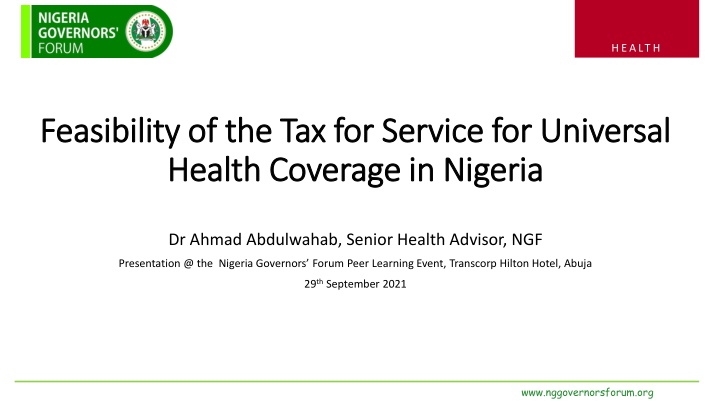

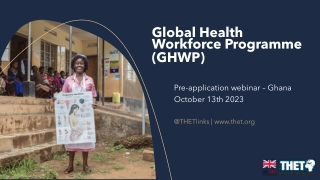

![Town of [Town Name] Real Estate Tax Rates and FY 2024 Budget Summary](/thumb/62211/town-of-town-name-real-estate-tax-rates-and-fy-2024-budget-summary.jpg)

